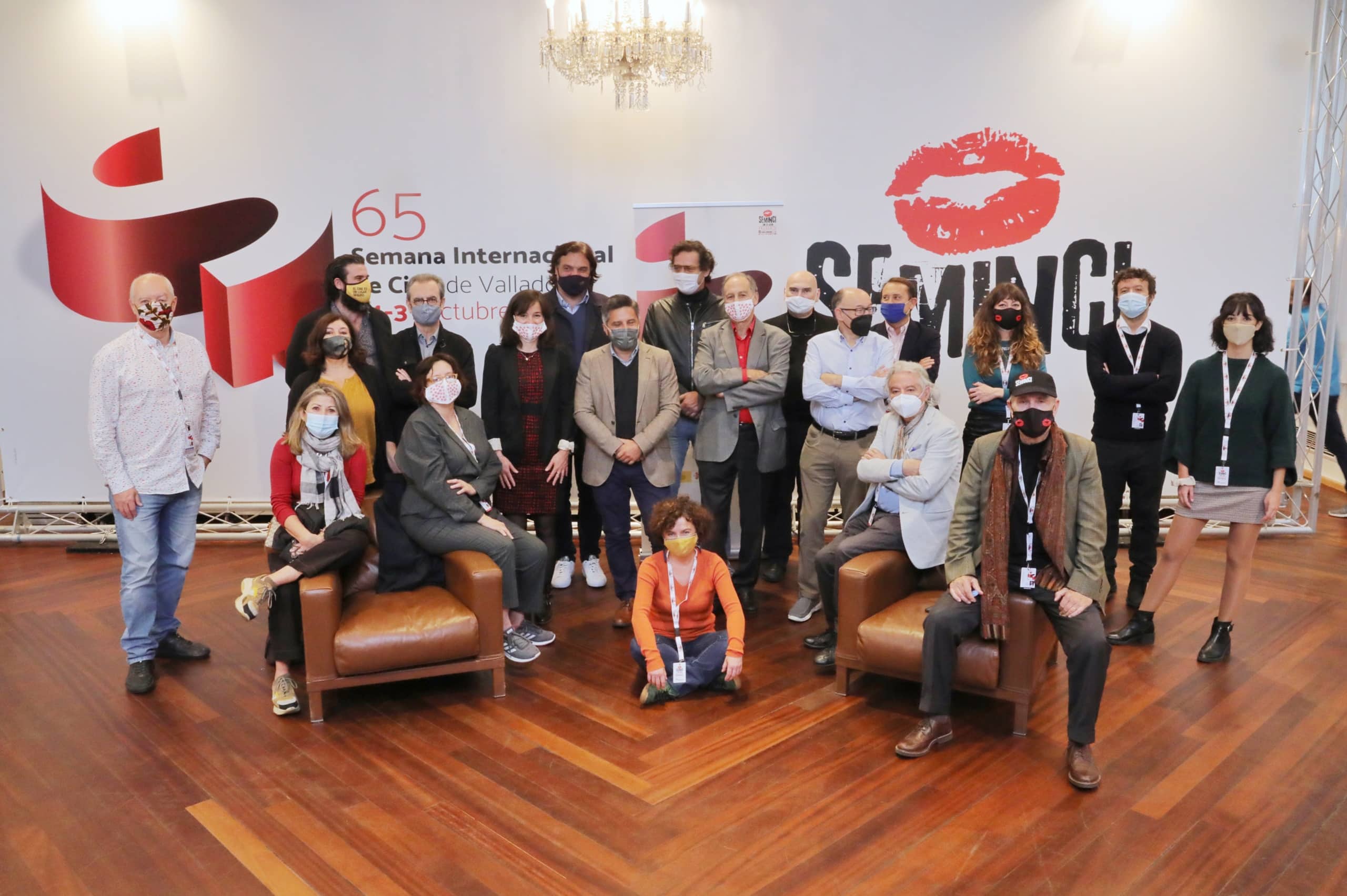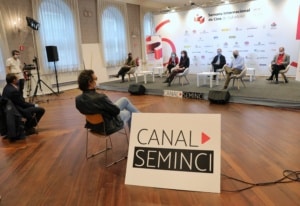
- This is the first time that such a forum, involving Spain’s top-level fest directors, independent distributors and institutions, takes place
- This Wednesday, under the auspices of the 65th Valladolid International Festival, a provisional memorandum was drawn up including 12 conclusions about the sector
10/28/2020.- Some thirty festival directors, independent distributors and institutional representatives met this Wednesday morning in Valladolid under the auspices of the 65th edition of Seminci in order to draw up a document containing the conclusions of the one-day meeting on “Cultural Diversity: Film Festivals and Independent Film Distribution”, an unprecedented event that put the focus on the sector’s challenges so as to jointly provide solutions for the future.
A list of twelve conclusions make up this provisional document which, among other issues, voices a commitment to reinforcing the symbiosis between independent distribution and film festivals and the understanding of cinema as an essential asset of Spanish culture.
The discussion was extended later in the day during the round table scheduled by the Festival and chaired by former Film Week’s director for 20 years Fernando Lara: an event attended by important figures in the film industry.
Among the professionals who shared their views on those 12 concluding points was Elisa Rodríguez, deputy director of Promotion and International Relations at Spain’s Institute of Film and Audiovisual Arts (ICAA). Rodríguez confirmed that maintaining grants-in-aid schemes for Independent distributors and film festivals continued to be a priority for ICAA.
“This year, for example, the funding scheme for festivals has been adapted so as to include as eligible expenses related to the pandemic, and we will certainly take into account the special circumstances of 2020 as regards supporting film distribution in 2021. We are aware of the special period we are going through and we are working hard in order to adapt ourselves to the new situation within the framework of Spain’s Administration. You have our full support”, claimed the ICAA representative.
José Luis Rebordinos, director of the San Sebastián Film Festival, also participated in this forum. He recalled that the Venice Mostra had invited other European festivals back in September to reach a consensus on a declaration of principles where “simple but important demands” were made. As a result of these developments, it was made clear that movie theatres are the ideal places to enjoy cinema, that film festivals constitute a film lovers’ community and a space to exchange experiences, and that collaboration among the latter should be encouraged, said Rebordinos.
“Valladolid has been successful in bringing together several of the most important Spanish festivals in order to voice concerns that are commonly shared by all of us in this troubled and pandemic period, although some of these concerns go back to pre-pandemic times… Today’s initiative is a clear success, and a continuation of what happened in Venice”, he claimed.

In turn, Juan Antonio Vigar, the director of the Málaga Film Festival (originally scheduled in March but then postponed until August due to the coronavirus pandemic) insisted that the partnership between distributors and festivals is essential. “We won’t be able to get out of this situation each alone. In fact, the Malaga Festival was eventually made possible thanks to the sympathy and support of distributors and producers. Unity is necessary and it was unity that made it possible for 80% of the programmed films to be screened”, he argued during the round table discussion.
Vigar also highlighted the importance of nurturing film audiences’ relish for theatrical screenings, so that viewers return to movie theatres after these pandemic-riddled times when “film-going habits were lost”. “We need to become activists in this sense, so that the public knows that culture is safe”, said Vigar.
Valladolid Festival director Javier Angulo addressed participants to explain that when the pandemic broke out in March, the first thing he did was talk with both, film directors and distributors, to decide whether it was feasible to celebrate this 65th edition; they seemed pretty confident and he reached the conclusion that Valladolid’s Film Week “had to be held physically or else be cancelled”. Online screenings and events could be a helpful supplement, but “never an end in themselves”, as highlighted in the provisional document drafted today.
For her part, Milagros Mayi, the director of RTVE’s Procurement Department expressed her agreement with the event’s provisional conclusions drawn up this Wednesday in Valladolid, but she qualified her support by arguing that a clear solution was still missing. Debate moderator Fernando Lara recalled that for the moment a realistic approach to the situation in the sector had been taken and that additional strategies were welcome.
Another professional participating in the Valladolid forum was Enrique González Kühn, the head of film distributor Caramel Films, who expressed his reservations at “landing in the hands of three or four media platforms, so that we all end up watching the same products. “For this reason he called for “a struggle on behalf of our film industry”. Daniel Bajo, chief manager at Karma Films, called on the media to give more coverage to film festivals, because otherwise these events’ impact will be limited to the local level, “whereas the whole point about festivals is to transcend and to cross borders.”



























![Logo Foro Cultural de Austria Madrid[1]](https://www.seminci.com/wp-content/uploads/2024/09/Logo-Foro-Cultural-de-Austria-Madrid1-300x76.jpg)








